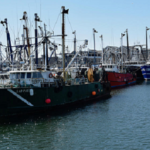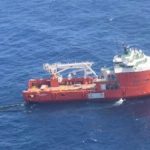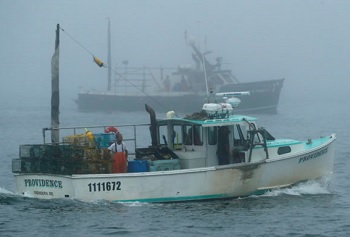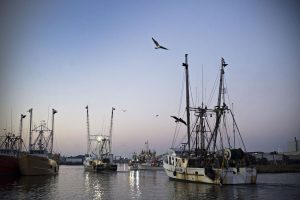Massachusetts Launches ‘Ropeless’ Fishing Feasibility Study
January 21, 2021
The twelve-month project will evaluate fishing, legal, regulatory, technological challenges and opportunities of alternative lobster gear, which could reduce whale entanglements.
The Massachusetts Division of Marine Fisheries (DMF) has launched a comprehensive scoping project to assess ‘ropeless’ fishing gear in the New England lobster fishery. A first of its kind on an accelerated timeline, the project will interview dozens of fishermen, technologists, policy experts, and scientists to fully evaluate the challenges and opportunities of the new gear type. The project is funded in part by the National Fish and Wildlife Foundation in partnership with the National Oceanic and Atmospheric Administration (NOAA), the federal agency that manages our nation’s fisheries in federal waters.
‘Ropeless’ gear is a type of fishing gear that uses high-tech alternatives to the traditional buoy line equipment used in lobster, crab , and fish pots, and some groundfish fisheries. Most types of ropeless gear are designed to prevent entanglements with marine mammals including North Atlantic right whales using submerged buoys activated by time-release mechanisms or signals transmitted from the surface. While the body of prior research on ropeless gear has focused on the mitigation of risk to endangered marine life, there is still much to learn about the technological, legal, and regulatory ecosystems of ropeless gear as well as operational and economic unknowns for the region’s fishermen and coastal communities. DMF’s project will build our knowledge on each of these issues and produce a set of recommendations for future policy development and possible implementation.
“Ropeless gear represents a sea change for the fishermen who would use it or interact with it on the fishing grounds,” said Daniel McKiernan, director of the Massachusetts Division of Marine Fisheries. “As with any proposed experimental fishing gear type, ropeless gear warrants a thorough analysis, and the urgency of this important conservation and economic issue is motivating our agency to act quickly. Our project will close the loop on the subject by analyzing previously unaddressed opportunities, challenges, and requirements for the use of ropeless fishing gear, while taking the feedback of fishermen, conservationists, and all stakeholders seriously. This project puts the Commonwealth of Massachusetts in a central leadership role advancing marine mammal conservation and fisheries management in an intelligent, equitable, and collaborative manner.”
For more details about this project please click here or send an email to [email protected].

















































